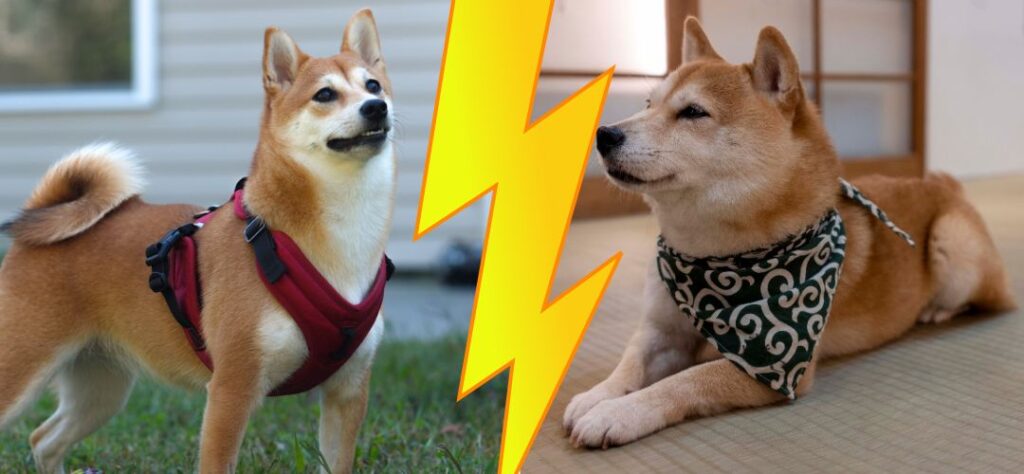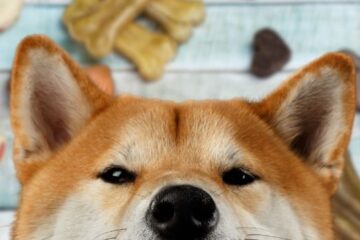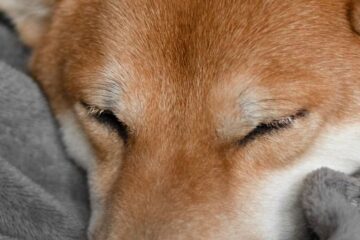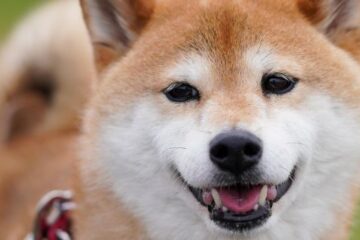Are Shiba Inus inside or outside dogs? | If you’re a fan of Shiba Inus, then you know that they can often be found in all sorts of places – from the couch to the park! But what makes them such versatile dogs? Are Shiba Inus really designed to live indoors or should they spend most of their time outdoors? Let’s take a closer look at this question and determine once and for all if Shiba Inus are inside or outside dogs. Read on for the answer!
Well, the answer isn’t so simple. While Shiba Inus might seem like they’d be more at home inside, they actually require a lot of exercise and stimulation. Without regular activities, they can become bored and destructive. So, if your pup loves going for walks or playing outside with you then it’s definitely best to take them out! However, if your Shiba Inu is more content lounging around indoors, then keeping them as an indoor dog could work too – just make sure to provide plenty of stimulating activities for them!
At the end of the day, Shiba Inus are incredibly adaptable dogs who can easily adjust to different environments. Whether you decide to keep yours inside or outside depends on their individual personality and the amount of activity they need. Either way, with proper care and attention, your Shiba Inu will thrive!
How do you keep a Shiba Inu outside?
Keeping your Shiba Inu outside requires some extra attention and care. Firstly, you’ll need to make sure that your pup has a safe space to stay while they’re outdoors – ideally, this should be an area enclosed with a fence or gate. Secondly, it’s essential to invest in the right outdoor gear for them – think a comfy bed, warm coat, and raincoat if necessary. Additionally, their diet must also be taken into consideration since they will require more energy due to being active outdoors. Ensure that you feed them high-quality food that meets their daily nutritional needs.
It is important to provide plenty of enrichment when keeping your Shiba Inu outside; activities such as interactive toys or puzzle games can help keep them stimulated and entertained. Of course, regular exercise is also essential – depending on your pup’s age and energy level, consider taking them for walks or runs every day. If you are unable to do this yourself, make sure that they have access to a fenced-in area where they can roam around and get some fresh air.
Finally, making sure that your Shiba Inu is comfortable outside is important. Consider the climate and temperature of the area they will be staying in; if it gets too cold or hot then you may need to adjust their bedding accordingly or bring them indoors temporarily. Additionally, check for any potential hazards (e.g., poisonous plants) that could put them at risk of harm while outdoors.

Can you keep a Shiba Inu in an apartment?
When it comes to keeping a Shiba Inu in an apartment, it’s important to consider that this breed of dog was originally bred as a hunting companion in rural Japan. As such, they may be better suited for living in more expansive and outdoor-friendly environments. That said, with the right preparation and dedication, it is possible for a Shiba Inu to live happily in an apartment.
The first step is ensuring that you have enough mental and physical space for your pup. This means providing them with ample opportunities to exercise – at least one hour of daily activity should suffice – as well as plenty of stimulating activities inside the home (e.g., interactive toys). Additionally, having access to an adequately sized outdoor area (e.g., a fenced-in balcony or courtyard) is essential for any apartment-dwelling Shiba Inu as it will give them the opportunity to get some fresh air and explore their surroundings.
When it comes to training, Shiba Inus are known to be quite stubborn and may require a lot of patience. This means that you need to be prepared to put in the time and effort into teaching them basic commands such as ‘sit’, ‘stay’, and ‘down’. Additionally, it’s important to remember that these dogs thrive on routine and structure – so try your best to establish a regular schedule for feeding times, walks, playtime etc.
Is Shiba Inu a cold weather dog?
Shiba Inus are well-adapted to colder climates and, depending on the individual dog’s unique physical characteristics, may even prefer cooler temperatures over warmer ones. Originally bred in mountainous regions of Japan, this breed of canine is known for its high energy levels and thick coat which help them withstand cold weather conditions. However, it’s important to note that when temperatures drop below freezing for extended periods of time, Shiba Inus can become susceptible to frostbite (especially on their exposed ears and tails). To keep your pup safe during winter months, make sure to provide them with adequate shelter from wind and rain as well as warm clothing options like coats or sweaters whenever they’re outdoors.
Additionally, Shiba Inus have a higher risk of developing hypothermia due to their small size – so be sure to limit your pup’s outdoor playtime during the coldest days of winter and always supervise them closely while they explore outdoors. If you live in an area with heavy snowfall during winter months, it’s also important to keep your pup’s paw pads and fur clean as ice can build up between their toes, making walking uncomfortable for them. Finally, remember that these dogs require just as much exercise in cold weather as warm; aim for at least two 30-minute walks per day, or take your pup on short jogs if they’re feeling especially energetic!
Though the thick coat of the Shiba Inu may give them an advantage in colder climates, owners should always take proper precautions for keeping their pup safe during winter months. With the right amount of care and attention, this breed can remain happy and healthy in any weather!
Where should Shiba Inu sleep?
Shiba Inus are a breed of Japanese dog that is generally known to be quite independent. This means they will often make their own decisions about where and when they want to sleep, and can sometimes have preferences for certain places in the home.
In general, Shiba Inus prefer to sleep in a quiet environment away from any noise or distractions. As such, it’s best to provide them with a comfortable sleeping area that is sheltered from loud noises or bright lights. Providing your pup with a bed or crate placed in an out-of-the-way corner of the house can help ensure that their rest time remains free of disturbance. Additionally, if your pup tends to get chilly during cold weather months, you may also wish to provide them with an insulated bed or blanket.
Alternatively, many Shiba Inus will also opt to sleep on the floor in a warm spot near their owners. If your pup enjoys snuggling up at your feet for extra warmth and comfort, be sure to provide them with a soft surface such as a cushioned dog bed or blanket. Additionally, if your pup tends to wander off during the night, it’s important to ensure that all exits including windows and doors are securely closed so they can’t escape the house while sleeping.
Overall, providing your Shiba Inu with a comfortable space of their own should help ensure that they get adequate rest each night. Whether they choose to snuggle up near you, wander around during the night, or cuddle up in a corner of the house, giving them a cozy spot to sleep is essential for their wellbeing.
When it comes to going outdoors and sleeping there, Shiba Inus can be just as comfortable outside as they are indoors. While some owners may decide to bring their pup camping or on other outdoor adventures, they should always provide proper shelter from the elements such as a warm bed or crate if possible. That said, due to their relatively thick coat and natural ability to adjust to temperature changes with relative ease (including cold weather), these pups can often find a comfy spot outside given enough time and attention. Thus, with proper care a Shiba Inu can be a perfect fit for both inside and outside living.
Can Shiba Inus find their way home?
The answer to this question really depends on the individual Shiba Inu. While some breeds of dogs may possess a strong homing instinct and be able to find their way home even in unfamiliar surroundings, this isn’t always true for all Shiba Inus.
It’s important to note that purebred Shibas are not known to have an innate homing ability, but rather they rely on more traditional methods like following smells or physical landmarks to make it back home. This means that if your pup does ever manage to escape from your house or yard, you should take steps immediately to increase their chances of making it safely back home again.
One thing you can do is equip them with an identification tag which includes your contact information. This way, if someone finds them on the street they can return them to you right away. Additionally, you may want to have your pup microchipped in case the collar or tag is ever removed or lost. This makes it even easier to identify and contact you should someone find your dog wandering around out in public.
Finally, it’s important to note that regardless of any homing instincts a Shiba Inu may or may not possess, taking preventative steps like keeping your yard secure and always walking him on a leash is the best way to ensure that he never has an opportunity to wander off in the first place. With these basic safety measures and some luck, a Shiba Inu can remain safe and sound and find their way home again if they ever manage to escape.
Can Shibas be in the snow?
Yes, Shibas can be in the snow – as long as they are properly cared for and don’t overdo it. Despite their thick fur coat, Shiba Inus can still get cold and suffer from frostbite if exposed to extreme temperatures for too long. Therefore, it is important to take precautions when letting your pup play in the snow.
Before taking your Shiba outside in the snow, you should make sure that he is wearing a warm jacket or sweater to help protect him from the cold temperatures. Additionally, keep an eye on how much time he spends playing around in the snow; if you notice any signs of shivering or discomfort, bring him back inside immediately.
When going out to play in the snow, it’s also important to make sure that your pup has a safe place to hide from any potential predators. A small shelter or outdoor enclosure with a warm bedding is ideal for keeping him safe and comfortable while he enjoys the winter wonderland.
If you’re planning on taking your Shiba on a long walk through the snow, consider purchasing some waterproof boots to help protect his feet from the cold and wet conditions. This will ensure that he can stay outside longer and enjoy all that snowy fun without risking any frostbite-related issues down the line.
Do Shiba Inu need clothes in winter?
The answer to this question largely depends on where you live. If your area experiences temperatures below freezing during the winter months, then it’s a good idea to invest in some clothes for your Shiba Inu. Not only does this help keep him warm and comfortable during those chilly days, but it can also protect his fur from getting wet and matted when out playing in the snow.
When picking out clothes for your pup, you should look for items that are made from breathable fabric such as cotton or fleece. These materials will help keep him warm without trapping sweat and moisture on his skin – which could lead to discomfort or even rashes over time. Additionally, make sure that any clothing you purchase fits properly; too loose or too tight can cause issues with movement and breathing.
Shiba Inus also require a bit of extra protection from the elements when they’re out and about. A waterproof coat is essential for preventing snow and rain from soaking him to the bone, while a warm sweater or jacket can help keep his core temperature regulated in colder temperatures. And don’t forget to get some boots – these will help protect his paws from snow-covered surfaces as well as icy patches that could potentially cause injury.
Does Shiba need blanket?
No matter where your pup lives, a few blankets are essential for keeping him warm and comfortable. This is because Shiba Inus have a double coat that traps their body heat – making them more prone to getting chilled if they don’t have an extra layer of warmth.
When picking out blankets for your pup, ensure that they’re made from breathable fabrics such as cotton or fleece. These materials allow air to circulate while still providing the necessary insulation from the cold. Additionally, opt for blankets with smaller weaves; this will help prevent tangling and matting in his fur over time.
For outdoor use, you may want to look into “polar-style” blankets that can help protect your pup from the elements. These blankets are usually made of waterproof materials and often come with reflective strips for better visibility. They’re also designed to be lightweight, making them great for hiking trips or any other time you need to keep your pup warm on-the-go.
Finally, when shopping for a blanket make sure that it fits your Shiba Inu properly (not too large or too small). This helps ensure optimum comfort and can help prevent issues such as entanglement or discomfort during movement. With the right blanket in tow, your pup will be ready to tackle all the adventures life has to offer.
Happy snuggling!
How often should I walk my Shiba IInu?
The amount of exercise your Shiba Inu needs depends on a few factors, such as their age, size and overall activity level. However, it’s important to keep in mind that these pups are energetic and need regular physical activity to stay healthy and happy.
For adult Shiba Inus, experts recommend walking them for at least 30 minutes each day; however, this can be broken up into multiple walks throughout the day if needed. During each session, take time to explore different terrain such as dirt paths or grassy fields. This will help give your pup mental stimulation while getting some much-needed physical exercise. Additionally, try incorporating fun activities like chasing after a ball or frisbee during each walk – this will help keep them engaged and motivated.
If you’re looking for a more intense workout for your pup, try jogging or running with them. However, make sure to check with your vet beforehand – especially if you have an older dog – to ensure that they can handle this level of activity without putting too much strain on their joints.
For puppies, it’s important not to overexert their growing muscles and bones; therefore, experts recommend limiting exercise time to 5-10 minutes per day in the early stages. This should increase gradually as they get older and as their energy levels ramp up.
No matter what age or breed of dog you have, regular physical activity is vital for their overall health and happiness. Whether it’s a leisurely stroll around the block or an energetic game of fetch, taking your pup outside for exercise is the perfect way to show them some love while also helping them stay healthy. So grab those leashes and get out there! Your four-legged companion will thank you – and so will your wallet!
At the same time, taking your pup to a nearby dog park is also an excellent way to get them some exercise and socialize with other furry friends. Plus, it’s a great chance for you to get out of the house and meet new people with similar interests! So if you’re looking for an enjoyable activity to do with your pup, be sure to check out what local dog parks have to offer. Your Shiba Inu will definitely appreciate it!
Conclusion | Are Shiba Inus inside or outside dogs?
Regular physical activity is important for all dogs, regardless of age or breed. Experts recommend walking them for at least 30 minutes each day, as well as incorporating other activities like running or playing fetch. Puppies should only do 5-10 minutes of exercise per day until they get older and their energy levels increase. Exercise is beneficial for the pup’s mental stimulation and physical health, while also being a great way to show them some love. So make sure to give your pup some outdoor time every day!


